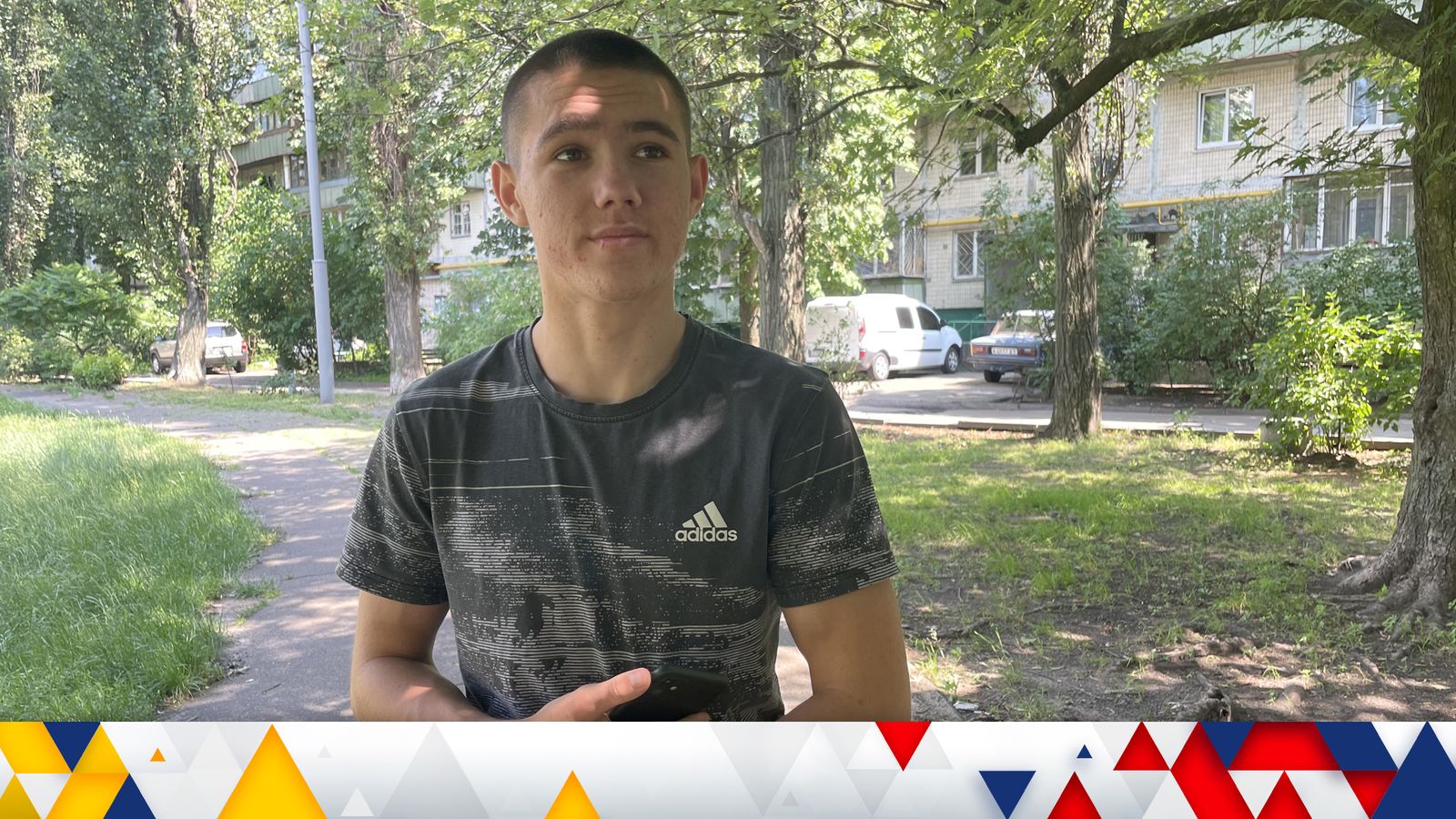In October last year, Tetiana Bodak was away from her home in southern Ukraine attending her mother’s funeral.
While she was out, armed Russian men in balaclavas arrived and ordered her 17-year-old son Vlad Rudenko to go with them.
He at first refused but realised he had little choice.
“They had weapons with them. And I understood that everything could get bad. So I packed my things and went with them. Better not to mess around with them,” he told Sky News.
Ukraine latest: Russian forces leaving nuclear power plant
It was the beginning of eight months in Russian hands – being in Russian-controlled territory camps whilst separated from his family, his home and everything he knew and trusted.
Tetiana was beside herself.
Ukraine charges Russian politician with war crimes over alleged deportation of orphans from Kherson
Wagner rebellion: Where are Yevgeny Prigozhin, General Surovikin and Dmitry Medvedev?
Russia reducing personnel at Zaporizhzhia nuclear plant, says Ukraine
“He was not allowed to leave because of the tragedy that had just happened to us. When I found out he was already gone, I was very angry,” she said.
“I missed and worried about him, especially when there was no communication, when the connection was cut off. I was very concerned and missed my son a lot.”
Vlad’s new life was one of indoctrination by the Russians.
In photos he sent his mother from one camp after another, he was beginning to change. They showed him brandishing a gun and boxing. He had never played any sport before.
But there were more worrying signs too, of injuries, a broken leg and broken finger.
There was mental and physical abuse, he says, and he was punished when he tried to leave.
“I felt bad because I didn’t like the place I was in, and I was interrogated and asked why I left, I said I want to come home to Ukraine,” he said.
‘Cash and a flat to become Russian’
The Russians put Vlad in solitary confinement, he says, where he considered killing himself.
“It was difficult. Five days of not talking to anyone.
“And all you just see is someone bringing you food and you’re sitting and thinking what to do. You’re just isolated, you don’t hear anything, it’s like you’re deaf and I was thinking about suicide.”
The camps were in Russian-controlled Crimea and occupied Kherson region.
Vlad says the children are told there that Ukraine is run by Nazis, that their families did not expect them home, and they are offered incentives to aspire for Russian citizenship – including the promise of cash and apartments.
They are made to sing the Russian national anthem.
Read more on Sky News:
Ukraine charges Russian politician with war crimes over alleged deportation of orphans
Prigozhin’s whereabouts unclear in absence of any clear direction from Putin
The Russians claim they are saving children from war for humanitarian reasons.
They say they intend to return children who have been evacuated from the conflict zone to Ukraine when the conditions there are safe enough for them to do so.
Children being “forcefully brought to Russia” is an issue that has been “totally overblown”, they say.
Back home, Tetiana asked an NGO for help. She and a handful of mothers plotted with ‘Save Ukraine’ on ways to bring back their children.
Mum interrogated after rescue mission
To rescue Vlad, Tetiana would risk a perilous journey from Ukraine into Poland, then Belarus, before flying to Moscow and overland through Russia into occupied Ukraine.
It spanned thousands of miles and took over a week, when finally, she was reunited with her son. She recalled the moment.
“Tears, tears. I was crying. I just hugged him and cried. I didn’t have any other emotions, just tears were running from my eyes,” she said.
But her ordeal wasn’t over: the Russians held Tetiana for six days and interrogated her for 10 hours, even placing a bag over her head, leaving her haunted by the ordeal.
“Every time I think about it, I just want to forget it, like a nightmare that never happened. I had lots of different thoughts.
“I worried that they could have taken me and I would have never returned, and I feared that I would never see any of my children again, not just Vlad,” she said.
Ukraine on Friday announced the first charges over the alleged deportations of thousands of children to Russia.
Two collaborators have also been charged over the incident – said to have involved 48 orphans, aged between one and four, being taken from a Kherson children’s home.
Their exact location is unknown but prosecutors say they could have been illegally adopted or taken to Russian institutions.
Authorities shared a video said to show one suspect helping put the children on a bus marked with the pro-Russian “Z” symbol.
The suspects’ names are redacted in documents – and they are thought to be in Russia or Crimea – but the trial could be held without them present.
Kremlin spokesman Dmitry Peskov said Moscow ‘firmly rejects’ accusations of child abduction.
“Our military, repeatedly risking their own lives, took measures to save children, to take them out from under shelling, which, by the way, was carried out by the armed forces of Ukraine against civilian infrastructure,” he said.
Eventually, the Russians let both go, to make the long journey back to Ukraine.
They’re stuck in Kyiv now, home is too dangerous to go back to because of Russian shelling.
But Tetiana’s worries haven’t ended.
She said Vlad’s eight months in Russian camps have changed him and he can’t open up about what really happened.
“It pains me deeply that I’ve come all this way and he just pushes me away. I feel offended.
“But I understand him, as a mother I forgive him, because I don’t know the whole truth about what had happened to him. Maybe he is doing this because he wants to protect me,” she said.
The NGO that helped Tetiana bring Vlad back says the others left behind are being turned into young Russians to help with the war on Ukraine.
Mykolo Kuleba, from Save Ukraine, told Sky News: “The worst is that these children will be growing with the hate of Ukraine.
“They will grow and receive Russian citizenship and go fight against Ukraine to understand that Ukraine is the enemy, and I’m very afraid that we will lose thousands, or hundreds of thousands of children, who Russia has brainwashed.”
Be the first to get Breaking News
Install the Sky News app for free
Vlad may be back on Ukrainian soil, but the trauma inflicted by the Russians is still with him and his mother.
Across occupied Ukraine and deep into Russia, so many more like him have yet to come home and perhaps never will.
:: Anyone feeling emotionally distressed or suicidal can call Samaritans for help on 116 123 or email [email protected] in the UK. In the US, call the Samaritans branch in your area or 1 (800) 273-TALK.








